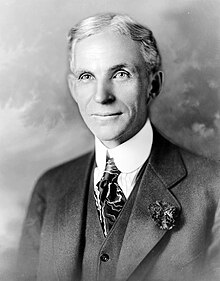
|
Henry Ford
|
|
|---|---|

Ford, c. 1919
|
|
| Born | July 30, 1863 Springwells Township, Michigan, U.S.
|
| Died | April 7, 1947 (aged 83) Fair Lane, Dearborn, Michigan, U.S.
|
| Resting place | St. Marthas Esiscopal Church Cemetery, Detroit, Michigan |
| Nationality | American |
| Occupation | Engineer, industrialist, philanthropist |
| Years active | 1891–1945 |
| Known for | Founding and leading the Ford Motor Company
|
| Title | President of Ford Motor Company 1906–1919 and 1943–1945 |
| Political party |
|
| Spouse(s) |
Clara Jane Bryant
(m. 1888) |
| Children | Edsel Ford |
| Parent(s) |
|
| Signature | |
Henry Ford (July 30, 1863 – April 7, 1947) was an American industrialist and business magnate, founder of the Ford Motor Company, and chief developer of the assembly line technique of mass production. By creating the first automobile that middle-class Americans could afford, he converted the automobile from an expensive curiosity into an accessible conveyance that profoundly impacted the landscape of the 20th century.
His introduction of the Model T automobile revolutionized transportation and American industry. As the Ford Motor Company owner, he became one of the richest and best-known people in the world. He is credited with "Fordism": mass production of inexpensive goods coupled with high wages for workers. Ford had a global vision, with consumerism as the key to peace. His intense commitment to systematically lowering costs resulted in many technical and business innovations, including a franchise system that put dealerships throughout North America and major cities on six continents. Ford left most of his vast wealth to the Ford Foundation and arranged for his family to permanently control it.
Ford was also widely known for his pacifism during the first years of World War I, and for promoting antisemitic content, including The Protocols of the Elders of Zion, through his newspaper The Dearborn Independent, and the book The International Jew.

